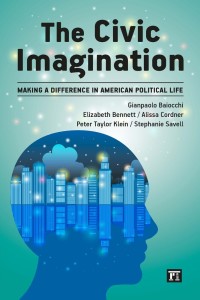The Civic Imagination: Making A Difference in American Political Life is an ethnographic account of activists and activism in America. Collaboratively co-authored by Gianpaolo Baiocchi, Elizabeth A. Bennett, Alissa Cordner, Peter Taylor Klein, and Stephanie Savell, it aims to understand how everyday citizens imagine a better future for their city and how they go about bringing that vision to life. As one reviewer noted: “By taking citizens’ civic work seriously, this book provides a valuable and easily accessible contribution for graduate and under- graduate students of sociology, politics, and social and civic culture. Moreover, it is an important read for activists, policymakers, and anyone interested in improving our democracy.” – Shauna A. Morimoto (available here)

Before you give up on our democracy, read this book! From an intense, on-the-ground experience, The Civic Imagination reveals that, despite our culture’s veneer of cynicism, democratic conversation and civic engagement are alive and deeply rewarding. The story told here—as well as the authors’ sharing of their collaborative challenges—confirms for me the deep, and too often unmet, human need for voice and agency. Just the book I need now! – Frances Moore Lappé, Director and Founder of the Small Planet Institute. Author of Diet for a Small Planet
I couldn’t put down this wonderful book! In a superbly insightful critique, which aims to repair the world instead of just complaining, the authors vividly portray very different types of citizens’ groups, from the sort that protest failing schools in poor neighborhoods to those that advocate building more dog parks, or hosting neighborhood Halloween parades. Each kind has democracy-promoting properties, as well as blind spots. Everyone who thinks about citizens’ abilities to address our country’s devastating social inequalities should read this gripping, delightful, funny, and theoretically important book. – Nina Eliasoph, University of Southern California
This book represents a welcome effort to document the vast energies that Americans expend in organizing in their communities—just as they claim to reject “politics” as corrupt. It is unusual in its emphasis on the importance of the historical moment on the emergence of different groups, strategies, and imaginations. The authors explore the different visions for the future and diverse strategies that citizens employ to make their voices heard. They show that many groups critical of inequality and neoliberal policies were already percolating before Occupy emerged – Ida Susser, CUNY Grad Center
There are plenty of exhortations to civic engagement. This book is more. It is an effort to understand how Americans imagine civic life and their roles as citizens and how this civic imagination works both as a basis for public participation and a limit to it. Based on empirical research it will also draw readers—and these should include students—into their own efforts to use knowledge to make a difference in public life. – Craig Calhoun, London School of Economics and New York University
ORDER from Amazon
REQUEST an e-inspection copy.
DOWNLOAD the preface.
READ our article in The American Journal of Sociology.
WATCH a discussion of findings on the Brian Lehrer TV show.
LISTEN to our interview on the Office Hours podcast series, a project of The Society Pages.
SEE a brief review and recommendation from CHOICE Reviews Online.
LEARN MORE:
From June of 2010 to July of 2011, we conducted a collective ethnographic study of civic culture. The Civic Imagination (Paradigm Publishers 2013) is a report of our findings, a snapshot of civic life in America, and a discussion of contemporary political culture, based on our experiences in Providence, Rhode Island. We recount a year in the lives of activists striving to make their city a better place. Those activists are part of seven civic groups, chosen for their diversity of interests, constituencies, tactics, and organizational forms. They generously allowed us into their work and their lives, and the book is motivated by the themes that emerged in this ethnographic field research.
Most significantly, where we expected to find cynicism, apathy, and individualistic commitments, we instead encountered reflective, sober, and tremendously hopeful citizens. On one hand, we heard repeatedly that the political system is broken, and grew accustomed to the common refrains, “I’m not political,” and “I don’t see my work as political.” On the other, we learned that these discourses were not necessarily signals of political disengagement, but instead part of a more complicated relationship with political life.
We were also attentive to the stark differences in how groups paid attention to (or ignored) inequality, both as a social problem to be solved and as an issue that plagues civic groups themselves. While inequality was central to the work of some organizations, it was more commonly a blind spot—something removed from the forefront of attention, or readily overlooked—and we discuss these observations from a more normative perspective, reflecting our own value of equality.
The Civic Imagination explores the contours of these complex relations—between citizens and their democracy, skepticism and engagement, and inequality and activism. It is written for several audiences—a chapter-length methodological appendix and extensive footnotes are meant to satisfy the curiosities and critical eye of academics and graduate students, while the prose, theory, and stories are plainly written for the undergraduate student or lay reader to digest with thoughtful ease.